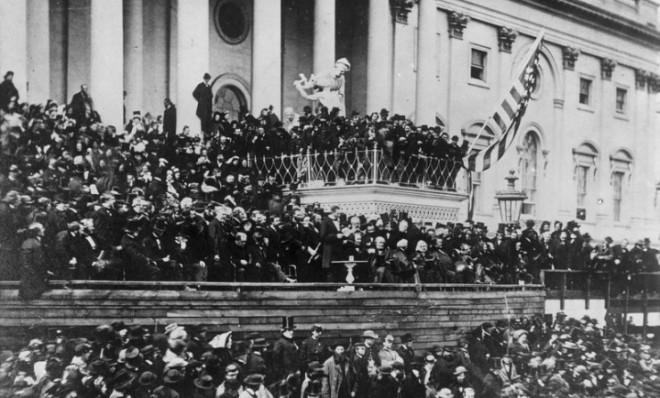Today in history: One of the greatest inaugural addresses in American history
In 1865, President Lincoln delivered his second inaugural address

A free daily email with the biggest news stories of the day – and the best features from TheWeek.com
You are now subscribed
Your newsletter sign-up was successful

March 4, 1797: In his inaugural address, President John Adams warned Americans not to lose sight of the ongoing threat to American liberty. Adams's inaugural was very colorful. It was the only time that outgoing President George Washington, Vice President Thomas Jefferson, who had been sworn in earlier that day, and Adams had ever appeared together at such a high-profile event. Before being sworn in, the president-elect told his soon-to-be First Lady Abigail that he was a nervous wreck, and that he felt as if he were on stage playing a part in a play. It was, he said, "the most affecting and overpowering scene I ever acted in."
Adams' inaugural speech was full of his gratitude of a free republican government, for state's rights, and of his belief in expanded education for all the people, both to enlarge the happiness of life and as essential to the preservation of freedom. Adams was also the first president to be sworn in by the Chief Justice of the Supreme Court (Oliver Ellsworth). Outgoing President George Washington, who declined to run for a third term, seemed relieved to relinquish the burden of the presidency; it was, historians said, as if a great weight had been removed from his shoulders.
March 4, 1829: To celebrate his inaugural, President Andrew Jackson hosted an open house at the White House. Inaugural open house events at the White House ended in 1885 for security reasons; Grover Cleveland opted to host an inaugural parade instead.
The Week
Escape your echo chamber. Get the facts behind the news, plus analysis from multiple perspectives.

Sign up for The Week's Free Newsletters
From our morning news briefing to a weekly Good News Newsletter, get the best of The Week delivered directly to your inbox.
From our morning news briefing to a weekly Good News Newsletter, get the best of The Week delivered directly to your inbox.
March 4, 1865: In one of the greatest inaugural addresses in American history, Abraham Lincoln, beginning his second term as president, spoke at a time of triumph: The Civil War was winding down and slavery receding into the history books. Yet Lincoln, filled with sadness and reflection, spoke not of victory, but of the damage that had been done to the country. He reminded both victor and vanquished that both sides had erred in going to war, despite their bitter disagreement over the war's central issue, slavery.
"With malice toward none; with charity for all," Lincoln said, "let us strive on to finish the work we are in; to bind up the nation's wounds."
The address is inscribed, along with his Gettysburg Address, in the Lincoln Memorial in Washington. In 2012, Peter Hitchens described the address as "one of the most overwhelming pieces of political prose ever crafted in any language."
Lincoln had no way of knowing, of course, that in the crowd that day was the actor John Wilkes Booth — who would assassinate the president just six weeks later.
A free daily email with the biggest news stories of the day – and the best features from TheWeek.com
March 4, 1933: Franklin D. Roosevelt was sworn in, beginning a frenetic "100 Days" of legislative action against which all successors have since been measured.
March 4, 1987: Acknowledging a "mistake," President Reagan took full responsibility for the Iran-Contra affair. Iran-Contra — the trading of arms for hostages in Iran and funding of rebels in Nicaragua — led to the convictions of 11 Reagan administration officials (some were vacated on appeal). There was talk of impeaching the president, though no conclusive evidence ever emerged showing that Reagan (despite took responsibility for the scandal) authorized the Iran-Contra deal.
Quote of the day
"With malice toward none; with charity for all...let us strive on to finish the work we are in; to bind up the nation's wounds." — Abraham Lincoln
More from West Wing Reports...
-
 Nuuk becomes ground zero for Greenland’s diplomatic straits
Nuuk becomes ground zero for Greenland’s diplomatic straitsIN THE SPOTLIGHT A flurry of new consular activity in the remote Danish protectorate shows how important Greenland has become to Europeans’ anxiety about American imperialism
-
 ‘This is something that happens all too often’
‘This is something that happens all too often’Instant Opinion Opinion, comment and editorials of the day
-
 House votes to end Trump’s Canada tariffs
House votes to end Trump’s Canada tariffsSpeed Read Six Republicans joined with Democrats to repeal the president’s tariffs